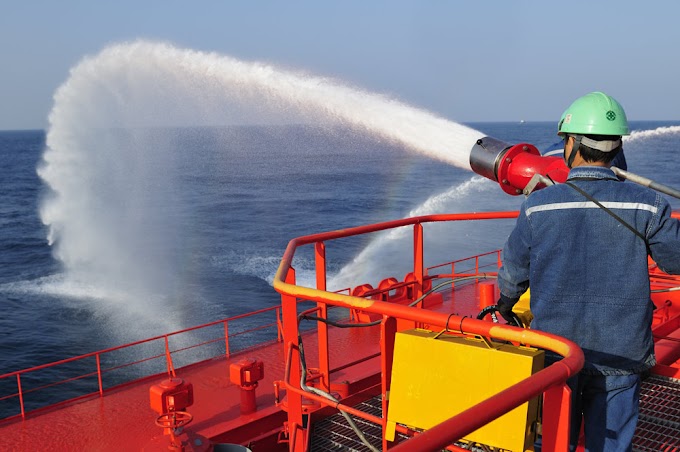HELLO my blog readers, WELCOME TO MY BLOG. I’m starting Merchant Navy Series to discuss the Marine Oceanic world, This blog will surely inspire all the readers as it has motivational information.
PART - 01
A Marine Engineer Officer plays a crucial role in the smooth
operation and maintenance of ships. Their primary responsibility is to oversee
and manage the technical aspects of a ship's machinery and propulsion systems.
They ensure that the ship's engines, boilers, generators, and other mechanical
and electrical systems are functioning efficiently and effectively.
The significance of Marine Engineer Officers can be
understood through the following key points:
1. Operation and Maintenance: Marine Engineer Officers are
responsible for operating and maintaining the ship's machinery and systems.
They oversee routine inspections, maintenance tasks, and repairs to ensure that
all equipment is in good working condition. By adhering to strict maintenance
schedules and implementing preventive measures, they minimize the risk of
equipment failures and breakdowns at sea.
2. Safety and Compliance: The safety of the ship and its
crew is of paramount importance. Marine Engineer Officers play a critical role
in ensuring that the ship meets international maritime safety and environmental
standards. They are familiar with regulations and guidelines related to safety,
pollution prevention, and emergency response. By adhering to these standards,
they help maintain a safe and secure maritime environment.
3. Troubleshooting and Problem-Solving: Ships operate in
complex and challenging environments. Marine Engineer Officers are trained to
troubleshoot and diagnose technical issues that may arise during voyages. They analyze problems, develop solutions, and coordinate repairs, either independently or in
collaboration with the ship's crew and external technicians. Their expertise in
problem-solving helps minimize downtime and ensures the ship remains
operational.
4. Efficiency and Performance: Marine Engineer Officers
strive to optimize the ship's performance and fuel efficiency. They monitor
fuel consumption, engine performance, and emissions to identify areas for
improvement. By implementing energy-saving measures and utilizing advanced
technologies, they contribute to cost reduction and environmental
sustainability.
5. Emergency Preparedness: In the event of emergencies, such
as engine failures or machinery malfunctions, Marine Engineer Officers are
trained to respond swiftly and effectively. They participate in emergency
drills and are responsible for the proper functioning of emergency systems and
equipment. Their preparedness and expertise are vital for the safety and
well-being of the ship's crew and passengers.
Overall, Marine Engineer Officers play a vital role in
ensuring the smooth operation and maintenance of ships. Their technical
knowledge, expertise, and commitment to safety and efficiency contribute to the
reliable and successful operation of maritime vessels.
* Highlight the importance of the Marine Engineer Officer's role in ensuring the safety and efficiency of the vessel's machinery and systems.
The Marine Engineer Officer's role is of utmost importance in ensuring the safety and efficiency of a vessel's machinery and systems. Here are the key reasons why their role is crucial:
1. Safety of the Ship and Crew: The machinery and systems
onboard a ship are critical for its safe operation. Marine Engineer Officers
are responsible for maintaining and inspecting these components to identify any
potential hazards or malfunctions. By ensuring that all machinery is in good
working order, they reduce the risk of accidents, equipment failures, and
potential dangers to the crew.
2. Prevention of Mechanical Failures: Marine Engineer
Officers follow strict maintenance procedures and schedules to prevent
mechanical failures. They conduct routine inspections, monitor performance, and
address any emerging issues promptly. By proactively identifying and addressing
potential problems, they minimize the risk of unexpected breakdowns and
operational disruptions, which could jeopardize the safety of the vessel and
its crew.
3. Emergency Response and Preparedness: In emergency
situations, such as fires, floods, or machinery failures, Marine Engineer
Officers play a vital role. They are trained to respond swiftly and
effectively, implementing emergency protocols and taking appropriate actions to
mitigate risks. Their knowledge of the vessel's systems and machinery is
crucial for quick troubleshooting and repair during critical situations.
4. Fuel Efficiency and Environmental Impact: Marine Engineer
Officers contribute significantly to the vessel's fuel efficiency and
environmental sustainability. They optimize the performance of engines and
systems, monitor fuel consumption, and implement energy-saving measures. By
reducing fuel consumption and emissions, they help minimize the vessel's
environmental impact, promote sustainability, and adhere to international
regulations.
5. Compliance with Safety Regulations: International
maritime safety regulations, such as the International Convention for the
Safety of Life at Sea (SOLAS), impose strict standards for the safety of
vessels. Marine Engineer Officers ensure compliance with these regulations by
conducting regular inspections, maintaining proper documentation, and ensuring
that safety equipment and systems are in place and operational. This adherence
to safety standards helps protect the vessel, crew, and passengers.
6. Efficient Operations and Cost Reduction: The smooth and
efficient operation of machinery and systems directly impacts the vessel's
overall performance and profitability. Marine Engineer Officers optimize the
performance of engines, generators, and other systems to maximize efficiency,
minimize downtime, and reduce operational costs. By managing fuel consumption,
maintenance schedules, and repairs, they contribute to the vessel's financial
viability.






